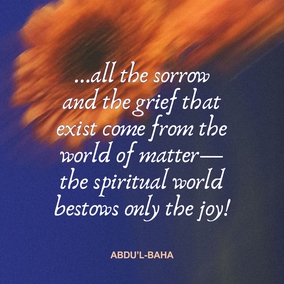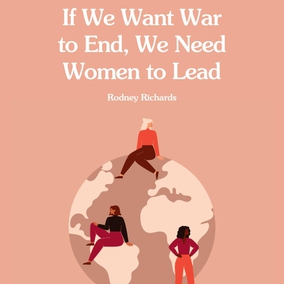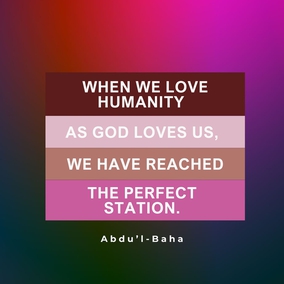The views expressed in our content reflect individual perspectives and do not represent the authoritative views of the Baha'i Faith.
On a music streaming service this morning, I happened to hear one of the many recorded versions of the song “No Man Is an Island,” which I remembered singing it at summer camp as a kid.
Before this morning, I hadn’t heard it for many years, but the words are as true today as when John Donne wrote the poem in 1624:
No man is an island,
Entire of itself.
Each is a piece of the continent,
A part of the main.
If a clod be washed away by the sea,
Europe is the less.
As well as if a promontory were.
As well as if a manor of thine own
Or of thine friend’s were.
Each man’s death diminishes me,
For I am involved in mankind.
Therefore, send not to know
For whom the bell tolls,
It tolls for thee.
They’re true, not only for individuals, but for groups of people who work together.
Incorporated into every workplace is the need to communicate and the need to cooperate. In recent years though, the ways we do this have dramatically changed. No longer are memos and meetings the norm. Instead, people email each other, even when sitting in the same room. Texting has replaced or supplemented the proverbial water cooler. Power lunches of the ‘80s are now just as likely to be done via real-time software. Detailed reports may be reduced to bullet lists, and rather than focusing on a single issue we are just as likely to be multitasking.
With so many options, the means for communications may be convenient — but what about the quality of the output? Has convenience replaced intimacy? Sure, we have more ways to communicate, but are we actually listening to each other? Is there true consultation — a concerted effort to find the truth and to reach consensus?
Emails, texting, and bullet lists are sufficient for transmitting some information and are especially effective for announcing news or broadcasting updates. But when there are complex problems to solve, hard decisions to make, or involved issues to face, then I prefer to sit down with others in real-time, without distractions; and use our technology to include those who would otherwise miss the meeting.
When we are together, how do we work together? I once went to a retreat that turned out to be just senior management making announcements — and countless times I have been at so-called “consultations” that were just opposing sides arguing for the adoption of their agenda.
But there have been other times, precious and uplifting times, when true consultation has occurred. They haven’t only been Baha’i gatherings, though they did follow the Baha’i concept of consultation, which has several beneficial aspects not present in most group meetings or events. Baha’u’llah, the prophet and founder of the Baha’i Faith, advised everyone to: “Take ye counsel together in all matters, inasmuch as consultation is the lamp of guidance which leadeth the way, and is the bestower of understanding.”
The process of Baha’i consultation begins with fact-finding rather than with the presentation and defense of opposing positions. All ideas belong to the group, and are no longer associated with the person who originated them. This serves to separate personalities from the issues. Following a frank and open discussion, the group tries to reach a unanimous decision, but if that cannot be achieved then the majority vote prevails. As soon as the decision is made then everyone, even the previous minority, supports the group decision.
The result of this process is unity of vision and unity in action; everyone is now moving in the same direction rather than trying to subvert others. This approach to consultation puts the interest of the whole ahead of individual or partisan interests. Since everyone has had a chance to participate and to voice their concerns, no one has been marginalized.
I realize this sounds idealistic — and to anyone who hasn’t experienced Baha’i consultation themselves, it might even seem impractical. That doesn’t surprise me, because this way of communicating and making decisions does pose several challenges.
First, it requires detachment. Often the decisions do not turn out as expected. Lacking detachment, we go to meetings armed with determination (maybe even a mandate) to sell our ideas and to convince others. Through consultation though, we can channel the passion behind those feelings into a search for truth or the best way. When this happens, we have become detached, not just from our own ideas but from the outcome itself.
Second, Baha’i consultation requires letting go of notions of power or ego. Taking its place is teamwork and group solidarity. Again, this isn’t easy, especially because it requires trust in others’ good intentions. One of the things we need to realize is that if we all work in the same direction then we can evaluate the worthiness of our decisions and, if necessary, tweak or rethink without anyone assigning blame to anyone else.
In many, maybe even most, workplaces these ideas will take time to practice and achieve. So group members might be motivated by considering the impact that consultation can have on their own personal growth. As the Baha’i International Community wrote in its paper titled Women and Development: “The consultative process itself promotes personal growth and collective solidarity.”
Tempted as I might be to work alone, and to make all of my own decisions without input from others, that’s not where my potential is fulfilled. Nor is it where the best results will be found. As the poem and the song say: “No Man Is an Island.” Not even me.















Comments
Sign in or create an account
Continue with Googleor